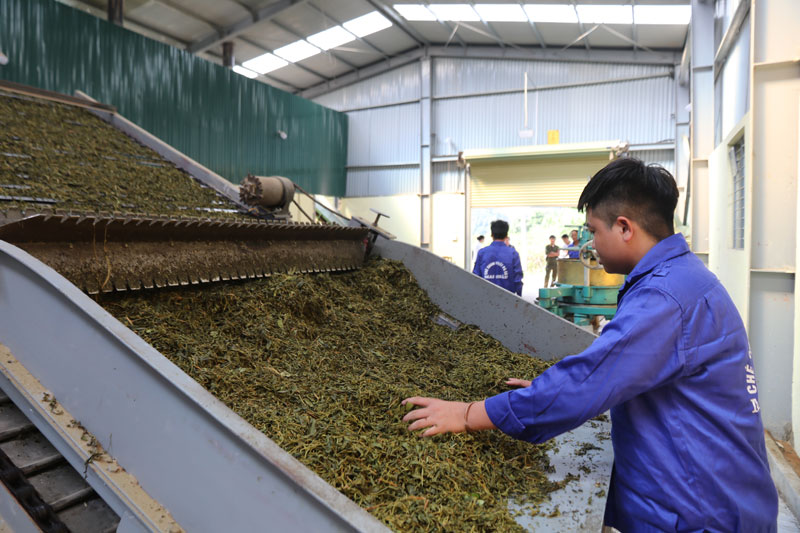
(HBO) - A Shan tuyet tea processing workshop was put into use in Pa Co commune in late May, which is considered a milestone in the strategy for sustainable development of production activities of Mong ethnic people in Mai Chau district.
Chairman of the Pa Co communal People’s Committee Sung A Mang said to
local residents, the tea processing facility, jointly invested by the State and
a business, has created a big opportunity for local economic development.
 The inauguration of the tea processing workshop,
invested with 3 billion VND by the State, has helped purchase Shan tuyet tea
from Pa Co residents in a timely manner.
The inauguration of the tea processing workshop,
invested with 3 billion VND by the State, has helped purchase Shan tuyet tea
from Pa Co residents in a timely manner.
The tea processing workshop in Pa Co commune was
invested with an estimated 4.5 billion VND (over 193,500 USD), including about
3 billion VND funded by the province’s budget. The remaining 1.5 billion VND
and the land were contributed by the Phuong Huyen plant seedling production and
business Co. Ltd.
The workshop is designed to process about 5
tonnes of fresh tea buds a day, but the current material supply is equivalent
to just one-third of the facility’s capacity. With the inauguration of this
facility, locals now no longer have to travel far to sell their tea.
Of the nearly 1,000ha of farmland in Pa Co
commune, there are 115ha of Shan tuyet tea trees, and 85ha of the area are
being harvested, generating 160 tonnes of tea leaves each year. Notably, about
760ha of the local farmland are under maize, but the income from this plant is
equivalent to only one-third of that from tea trees. Therefore, there remains
huge potential to develop Shan tuyet tea trees in Pa Co.
The commune’s tea output is aimed at 300 tonnes
of fresh buds annually by 2020. The operation of the tea processing facility in
Pa Co will help expand the tea farming area by replacing maize with tea trees
on hundreds of ha of land in not only Pa Co but also the neighbouring commune
of Hang Kia.
Vice Chairman of the Hoa Binh provincial
People’s Committee Bui Van Cuu said developing tea farming associated with
ecological and community-based tourism is a policy for the Mong ethnic
community in Mai Chau district in the years to come. With about 1,500 old tea
trees and farming expansion efforts, Shan tuyet tea trees will be the driver of
development in Hang Kia and Pa Co in the near future./.
Since the beginning of this year, under the direction of the Department of Agriculture and Environment, the Sub-Department of Agricultural, Forestry, and Fishery Product Quality Management has strengthened the integration of the professional activities to promote and guide the organizations and individuals in the production and trading of agricultural, forestry, and fishery products to comply with the legal regulations regarding the use of chemicals, pesticides and veterinary medicines in crop cultivation, livestock farming and aquaculture. They also provide guidance to processing and manufacturing establishments on keeping the records to trace the product origins and using food additives from the approved list according to the regulations.
Hoa Binh province saw a significant rise in state budget revenue in the first two months of 2025, heard a meeting chaired by Vice Chairman of the provincial People’s Committee Quach Tat Liem.
Ha Thi Ha Chi, a 26-year-old graduate in law, has taken an unconventional path by returning to her hometown in Mai Chau district to establish the Tong Dau Cooperative, creating stable jobs for local women and bringing Thai ethnic brocade weaving to the global market.
As the Lunar New Year 2025 approached, pork prices surged, creating a profitable season for farmers in Tan Vinh commune, Luong Son district. Taking advantage of the rising demand, Can Minh Son, a farmer from Coi hamlet, sold over 30 pigs at 69,000 VND/kg, each weighing more than 100 kg. After deducting expenses, his family earned a profit of over 50 million VND.
alternate member of the Central Party Committee, Secretary of the Hoa Binh provincial Party Committee Nguyen Phi Long on March 5 had a working session with Yan Jiehe, Founder and Chairman of the China Pacific Construction Group, one of China's largest private corporations in the field of transport infrastructure. Deputy Secretary of the provincial Party Committee, Chairman of the provincial People's Committee Bui Duc Hinh and leaders of provincial departments and sectors also attended the working session.
The electronic printed circuit board (PCB) manufacturing and processing plant of Japan’s Meiko Group, located at Da River Left Bank Industrial Park in Hoa Binh city with a total investment of over 200 million USD, is expected to create thousands of jobs and make a significant contribution to the local budget.



 The inauguration of the tea processing workshop,
invested with 3 billion VND by the State, has helped purchase Shan tuyet tea
from Pa Co residents in a timely manner.
The inauguration of the tea processing workshop,
invested with 3 billion VND by the State, has helped purchase Shan tuyet tea
from Pa Co residents in a timely manner.